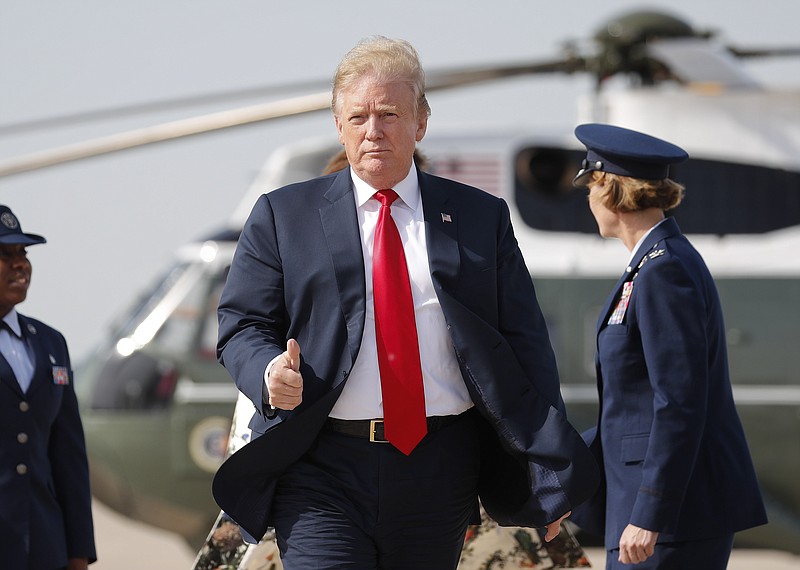Democrats, with good reason, have frequently chided deeply religious American Christians for voting for Donald Trump in 2016.
The president, who is a thrice-married, frequently mean-spirited, largely nonreligious individual, nevertheless has favored legislation important to that segment of voters.
Religious voters, if they can't have a candidate whose personal life inclines closely to their values - a Jimmy Carter or a George W. Bush, who were more forward about their religious convictions - at least want somebody who talks a good game but follows the talk with action.
Right or wrong, they see Trump that way. But, increasingly, they see neither the convictions nor the talk from Democrats.
Take last weekend's bombings in Sri Lanka, which targeted a Christian minority in a predominantly Buddhist country. Nearly 300 people died and more than 500 were injured at three churches, three hotels and a housing complex.
Whether or not Democrats played follow the leader or had a strategy in some convoluted way for responding, former President Barack Obama weighed in on Twitter at 10:02 a.m. on Easter Sunday by saying "the attacks on tourists and Easter worshippers in Sri Lanka are an attack on humanity."
By definition, "Easter worshippers" are Christians, but for some reason he couldn't bring himself to use that term.
It was mindful of Obama's presidency when he was unable to characterize the radical Muslims carrying out terrorist attacks as members of the Islamic faith. He didn't want to lump the terrorists in with good Muslims, he said, and impugn an entire religion.
The president, of course, had also pointed out at the 2015 National Prayer Breakfast that Americans should not "get on our high horse" about radical Islam since "people committed terrible deeds in the name of Christ" centuries ago.
Yet, the terrorists continued to slaughter innocents in the name of Islam.
On Sunday, following Obama's tweet, at 10:45 a.m. U.S. Rep. Ami Bera, D-California, tweeted that he was "deeply saddened over the horrific acts of violence against Easter worshippers and tourists."
At 11:08 a.m., Jared Polis, the Democratic governor of Colorado, tweeted that he was heartbroken "to learn about the attacks on tourists and Easter worshippers in Sri Lanka."
At 12:59 p.m., former San Antonio, Texas, Mayor Julian Castro, who is a declared 2020 Democratic presidential candidate, tweeted that "the evil of these attacks on Easter worshippers and tourists in Sri Lanka is deeply saddening."
And, finally, at 1:17 p.m., former presidential candidate Hillary Clinton said she was "praying for everyone affected by today's horrific attacks on Easter worshippers and travelers" - at least she didn't say "tourists" - "in Sri Lanka."
The wording, though perhaps just Democrats falling in behind their former leader's phrase, was nonetheless eerie.
If Democrats can't embrace the word "Christian" or "Jesus" - a video of once and future House Speaker Nancy Pelosi trying to do just that in 2010 went viral - how will they attract deeply religious voters who chose Trump, flaws and all?
Several already have made attempts and wound up as the hypocrites they accuse the president of being.
Pete Buttigieg, the mayor of South Bend, Indiana, and a self-avowed Christian, is the latest to fall in the trap. In a recent interview with USA Today, he allowed as to how God has chosen a side.
"We need to not be afraid to invoke arguments on why Christian faith is going to point you in a progressive direction," he said.
Buttigieg went on to say he was "reluctant to comment on another person's [faith]," then preceded to comment negatively on Trump's. Since then, he's also trashed the Christian faith of Vice President Mike Pence.
On Monday, though, during a CNN town hall in New Hampshire, perhaps knowing some who might be on the fence about Trump might be watching, he decided God hadn't chosen sides.
"At the very least," Buttigieg said, "we should be able to establish that God does not have a political party."
For him and for the rest of the crowded Democratic field, it's a matter of authenticity. Voters didn't find it in Obama, who got 4.5 million fewer votes in 2012 than in 2008 but won a second term against a weak Republican. Some of them oddly found it in Trump, who wasn't the solid family man his predecessor was but was willing to give voice to - and try to accomplish - what members of the electorate wanted.
The deeply religious part of that electorate is no different. They're not looking for perfection - and wouldn't ever find it, anyway - but do want a candidate who gives more than lip service to their faith and then works toward honoring what has been promised.
We don't believe at this point skeptical Trump voters have found such a candidate on the Democratic side.
